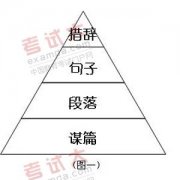根据选项的内容,四级听力短对话可分为事实状况题、行为活动题、观点态度题、地点场景题、谈论话题型、身份关系题和数字信息题七大类。对话内容不同,提问的角度和方式也不同。
一、事实状况题 问题是关于谈话的一方或双方说了什么、所处状态、做某事的原因何在、结果如何等。提问方式通常为: What do we learn from this conversation? What does the man mean? What can be inferred from the conversation? 此类题型解题技巧如下:
| 1.根据选项特点判断问题类型。 这类题目的选项一般都是某种事实情况的陈述,选项中句子的时态以一般过去时或一般现在时居多。 2.正确选项一般不会是原文的细节再现。 这类题目往往需要考生根据对话内容推测出说话人话语中隐含的事实细节,因此正确选项往往不是对话中的原文照搬,而是对话内容的同义转述,或是根据对话内容推断出的事实细节。 3.注意捕捉选项中的关键词。 听音前应提取选项要点,确定听音时应该捕捉的重点内容。一般某事的原因或结果常为考查重点。 4.对选项中及录音中涉及的关键信息进行标记,根据问题对号入座。 这类题目涉及的是原文中的细节内容,因而有必要将关键信息点加以记录,然后根据问题确定答案。 |
| [A] The man regrets being absent-minded. [B] The woman saved the man some trouble. [C] The man placed the reading list on a desk. [D] The woman emptied the waste paper basket. | M: I wish I hadn’t thrown away that reading list! W: I thought you might regret it. That’s why I picked it up from the waste paper basket and left it on the desk. Q: What do we learn from the conversation? |
| 【解析】事实状况题。选项中的the man,regret,trouble等词表明,对话内容与男士做错某件事有关。根据女士的话可知,她从垃圾筐里把男士丢掉的阅读目录捡起来了,因此避免了男士的麻烦,由此可知答案为[B]。 | |
| 1.根据选项特点判断题型。 一般来说,这类题目的选项都是动词短语形式,且动词一般为原形或动名词形式。 2.听音时留意对话中的动词,尤其注意与选项中动词相关的信息。 在留意动词的同时,要记录一些与该动词相关的重要信息,尤其是不止一个选项中的动词在对话中出现的时候,只有留意与其相关的信息,才能根据问题对号入座。 3.注意表示请求或建议的句式或短语。 行为活动类试题的对话中经常会包含提出请求或建议的句式或短语,如: Why don’t you…? What about…? Let’s…; You’d better…; If I were you, I would…; I’d like to…; You might as well…等,这此句式后面的内容有可能就是建议去做或准备去做的行为活动,很可能与答案直接相关,因此听音时需重点留意。 |
| [A] To find out more about the topic for the seminar.. [B] To make a copy of the schedule for his friend. [C] To get the seminar schedule for the woman. [D] To pick up the woman from the library. | W: Do you have the seminar schedule with you? I’d like to find out the topic for Friday. M: I gave it to my friend, bur there should be copies available in the library. I can pick one up for you. Q: What does the man promise to do? |
| 【解析】行为活动题。本题是问男士答应做什么事。选项均以不定式形式开头,表明本题与目的行为有关。注意对话中的pick…up不是表示“接(某人)”,而是表示“取(东西)”。 | |
| 1.根据选项特点判断问题类型。 观点态度类试题的选项中一般都含有一些引出观点态度的动词或短语,常见的有:think, believe, find, guess, imagine, consider, as far as I know等。根据这类线索词判断出试题类型以后,可以更有针对地留意说话人对自己观点态度的陈述。 2.熟悉表示观点态度的常见词语。 表示赞成:approve, agree, share, prefer, wise, reasonable, favorable 表示反对:disapprove, disagree, unwise, ridiculous, foolish, childish 表示赞赏:admire,appreciate,think much of, think highly of 表示喜欢:love, enjoy, wonderful,fascinating, funny, be fond of, be keen on 表示厌烦:dislike, bored/ boring, be tired of 表示关心:concerned, careful, care about 表示怨恨或生气:hate, hatred, angry, anger, initiated 表示害怕或担心:fearful, frightened, worried, nervous 表示批评或讽刺:critical, criticize, ironic,find fault with 表示失望或灰心:disappointed, discouraged 表示后悔或遗憾:regret, regretful, pity, shame 表示漠然或热情:indifferent, detached, careless, enthusiastic 表示积极或消极:active, positive, negative 表示自信或自负:confident, arrogant, proud 表示乐观或悲观:optimistic, pessimistic 3.抓住对话中的一些标识性的词语。 听音时应注意抓住一些表示因果、转折、比较或举例等逻辑关系的标识性的词语,如:but, instead, if, when, since, before, after, so 等,尤其是转折后的内容,往往表达作者的真实观点或态度,常为考查重点。 4.把握说话人的语气。 听音时应注意通过说话人的语气来判断说话人的态度,尤其是反问、疑问、感叹等语气,往往会明显地体现出说话人的态度或观点。 |
| [A] The Edwards are quite well-off. [B] The Edwards should cut down on their living expenses. [C] It'll be unwise for the Edwards to buy another house. [D] It's too expensive for the Edwards to live in their present house. | M: How do you like the new physician who replaced Dr. Andrew? W: I hear that the Edwards are thinking of buying another house. M: Should they be doing that with all the other expenses they have to pay? Anyhow, they are over 70 now, their present house is not too bad. Q: What does the man imply? |
| 【解析】观点态度题。本题是问男士暗示什么。选项中living expenses(生活开支)和buy another house表明对话应与the Edwards的生活开支和购房计划有关。对话中男士用反问语气(should they be doing…?)表示反对意见They shouldn't be doing…(≈It'll be unwise…to do…)。 | |
四、地点场景题问题是关于对话发生的场合、地点或者涉及到的人或事物所处的位置。提问方式通常为: Where is the conversation most probably taking place? Where are the two people? 此类题型解题技巧如下:
| 1.单个地点题:抓住与特定地点相关的常用词语。 这类题目的对话中一般不会提到具体场所,问题往往要求根据对话内容推测出谈话场所或某人的去向。考生要注意抓取信息词,即与特定地点相关的最常用词语。 2.多个地点题:依赖笔记,留意提问中的核心词。 这类题目对话中一般会提到几个地点,而就其中某一个进行提问,解题关键在于区分细节,对与选项相关的细节进行速记,并注意抓住提问中的核心词。 3.熟悉常考的地点。 四级对话中常涉及的地点场景包括: 诊所或医院(clinic or hospital) 餐馆(restaurant) 学校或校园(school or campus) 书店 (bookstore) 火车站 (railway station) 机场 (airport) 图书馆 (library) 邮局(post office) 银行(bank) 旅馆 (hotel) |
| [A] At a clinic. [B] In a supermarket. [C] At a restaurant. [D] In an ice-cream shop. | M: I’ll have the steak, French Fries, and let’s see, chocolate ice-cream for dessert. W: Oh-oh, you know these things will ruin your health, too much fat and sugar, how about ordering some vegetables and fruit instead? Q: Where does the conversation most probably take place? |
| 【解析】地点场景题。本题是问对话最可能发生在哪。由对话中 steak, ice-cream, order等关键词即可推断出对话应该是发生在餐馆。 | |
| 1.根据选项特点判断问题类型。 一般来说,这类题目的选项概括性都较强,且通常为短语;另外各选项所陈述的内容往往差别较大。 2.捕捉与话题相关的关键词。 只要能捕捉到对话中与该话题相关的关键词,往往就可以判断出对话谈论的内容。 3.熟悉常考话题相关词语。 考生在平时训练中,应留意与某类话题相关的词语并加以记忆。在本章第一讲中,我们将常考话题相关词汇进行了归纳和总结,以供大家巩固记忆。 4.注意不要只从对话一方的话语中寻找答案。 由于是考查谈话主题,因此双方的话语中应都含有与主题相关的线索词。 |
| [A] An art museum. [B] A beautiful park. [C] A college campus. [D] An architectural exhibition. | W: Waa, I do like this campus. All the big trees, the green lawns, and the old buildings with tall columns. It is really beautiful. M: It sure is. The architecture of these buildings is in the Greek style. It was popular in the 18th century here. Q: What are the speakers talking about? |
| 【解析】谈论话题题。本题是问说话双方正在谈论什么。抓住女士话中的campus即可确定他们谈论的是一所大学的校园。 | |
| 1.注意称呼语。 对话中的称呼语往往会直接暴露出说话人的身份或说话双方的关系,比如Mr.一词就表明对方很可能是自己的上级或老师。 2.捕捉关键词及人物语气。 解答这类试题,不但要熟悉体现某种人物关系或某种职业的相关词汇,而且要注意说话人的语气和态度,比如师生之间、夫妻之间、家长与孩子之间以及老板与员工之间的说话方式和语气均有自己的特点。 3.常考职业身份 四级对话中常涉及的职业身份包括: 教授(professor) 秘书(secretary) 医生(doctor) 老板(boss) 服务员(waiter/waitress) 主人 (host/hostess) 修理工(repairer, plumber, electrician…) 家庭角色(husband, wife, son, daughter, girlfriend…) 4.常考人物关系 四级对话中常涉及的人物关系包括: 夫妻(husband — wife) 父子(father — son) 母子(mother — son) 师生(teacher — student) 同学(schoolmate/ classmate) 同事(colleague) 老板与秘书(boss — secretary) 雇主与雇员(employer — employee) 医生与病人(doctor — patient) 服务员与顾客(waiter/waitress—customer) 主人与客人(host/hostess — guest) 警察与司机(policeman — driver) 管理员与借阅者(librarian — reader) 房东与租房者(landlord/landlady — tenant) |
| [A] Colleagues. [B] Husband and wife. [C] Employer and employee. [D] Mother and son. | W: John, what are you doing on your computer? Don’t you remember your promise? M: This is not a game. It’s only a crossword puzzle that helps increase my vocabulary. Q: What is the probable relationship between the speakers? |
| 【解析】身份关系题。本题是问两个说话者最可能是什么关系。由双方对话的语气可推知二者应该是母亲和儿子的关系。 | |
| 1.速记信息。 这类题目的对话中一般都不会只出现一个数字,因此一定要对出现的数字及相关要点信息进行速记。 2.听清问题。 做这类题目时,必须清楚地抓住问题是针对什么提问,然后才能根据记录的信息将答案对号入座。 3.不要直摄答案。 这类题目的答案一般都不会是原文中数字信息的再现,往往需要经过简单的运算才能得出答案。 |
| [A] At 10:30. [B] At 10:25. [C] At 10:40. [D] At 10:45. | M: So when are the other guys going to get here? The train is leaving in 10 minutes. We can’t wait here forever. W: It’s 10:30 already. They’re supposed to be here by now. I told everybody to meet here by 10:15. Q: When is the train leaving? |
| 【解析】数字信息题。本题是问火车什么时候离开。这类题往往是通过一次“加”或“减”得出答案。 | |






